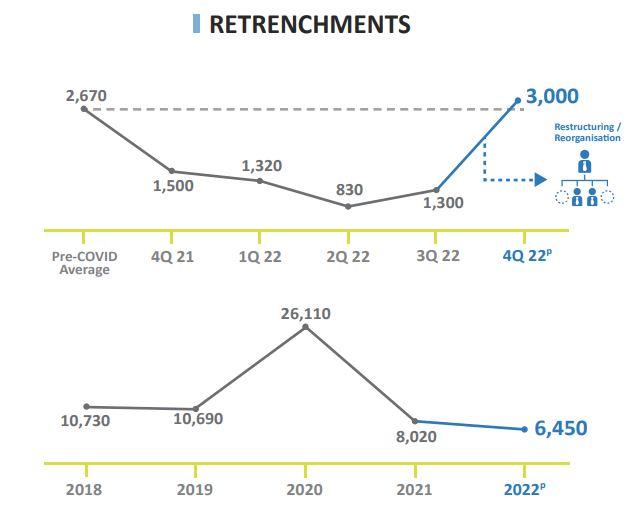Follow us on Telegram and on Instagram @humanresourcesonline for all the latest HR and manpower news from around the region!
share on
The fourth quarter of 2022 saw a rise in retrenchments, but the number remained comparable to pre-pandemic levels.
Advance estimates from Singapore's Ministry of Manpower (MOM) saw total employment expand for the fifth consecutive quarter in 4Q 2022, with unemployment rates staying low, below pre-pandemic levels. While the number of retrenchments rose from previous quarters’ lows, it remained comparable to pre-pandemic levels.
Overall, the labour market for 2022 improved significantly compared to 2021.
In line, unemployment rates have returned to pre-pandemic levels, and total employment surpassed the level in 2019. The number of retrenchments stayed low, despite increasing in 4Q 2022.
Total employment expanded, with increases seen for both residents and non-residents
Total employment, excluding migrant domestic workers, rose for the fifth consecutive quarter, expanding by 47,400 in 4Q 2022. While non-resident employment growth still contributed to most of the increase, it has moderated from the highs of the last two quarters, as the non-resident employment level approaches that of 2019. The increase in non-resident employment in 4Q 2022 was concentrated in construction.
Resident employment picked up over the quarter, amid hiring for year-end festivities in consumer-facing sectors such as food & beverage services and retail trade.
After the decline during the pandemic in 2020, total employment grew by an unprecedented 231,700 in 2022, and surpassed its pre-pandemic level by 3.0%. This was largely driven by non-residents, following the relaxation of border controls in April 2022 and the backfilling of vacancies, especially in sectors such as construction. Resident employment also continued to grow, albeit at a slower pace than in 2021 as resident unemployment rates improved.
Unemployment rates remained low
Unemployment rates remained low at pre-pandemic levels in December 2022 (overall: 2.0%; resident: 2.8%; citizen: 3.0%).
The labour market and economic recovery in 2022 has led to continued improvements in the unemployment situation, to its pre-pandemic steady state. The annual average unemployment rates were significantly lower in 2022 compared to 2021 (overall: 2.1% vs. 2.7%; resident: 2.9% vs. 3.5%; citizen: 3.0% vs. 3.7%).
Retrenchments rose over the quarter but remained comparable to pre-pandemic levels
The number of retrenchments rose in 4Q 2022 to 3,000 from the lows of the previous three quarters (800 – 1,300). The increase mainly reflected higher retrenchments in electronics (within manufacturing), and information technology and wholesale trade (within services). Retrenchments in other sectors were stable.
Despite the recent rise, the number of retrenchments in 4Q 2022 remained within the quarterly range observed in 2019. In fact, the total number of retrenchments for the whole of 2022 (6,450) was lower than 2021 (8,020) and pre-pandemic levels.
MOM identified business reorganisation or restructuring as the top reason for retrenchments in 4Q 2022.

Overall, although the labour market saw robust growth in 2022 and labour demand remains strong, MOM acknowledges the uncertain global economic environment, higher inflation, as well as geopolitical tensions going forward.
MOM's analysis shows: "While hiring sentiments remain positive in the coming months based on company polls, the projected slowdown in economic growth in 2023 would likely ease the momentum of labour market improvements. With the recent uptick in retrenchments, unemployment rates could also trend higher."
Agreeing with this sentiment, NTUC Assistant Secretary-General Patrick Tay, added: "Moving ahead, the labour market remains tight but there is a possibility of layoffs and unemployment rates creeping up in the first two quarters of this year due to ongoing uncertainties and drop in global demand affecting the manufacturing sector such as in electronics, besides the ongoing consolidation of the IT sector.
"Inflation is expected to remain high and cost of living will remain a challenge for all."
As such, he expressed hopes that the upcoming Budget 2023 will help alleviate some of these challenges.
Lead image / Ministry of Manpower
share on


